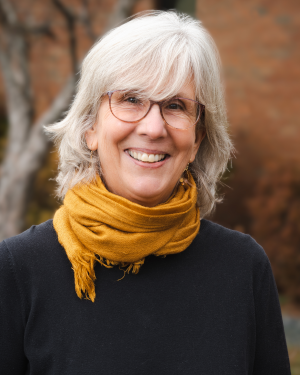Supporting Families During COVID via Telehealth
In 2020, Sarah Smith, DSc, OTR/L, and a team of interdisciplinary academic researchers and external stakeholders were awarded CoRE funding to evaluate an innovative family-focused intervention, the Healthy Families Flourish Program. An assistant professor of occupational therapy, Sarah’s research focuses on supporting families with children with special health care needs across New Hampshire. While traditional services target the health and development of a child with special needs, their families also play a critical role in the success of these interventions. Sarah developed the Healthy Families Flourish Program to support families’ ability to participate in everyday life activities like sharing a family meal, playing in the living room, or going on a walk for families who have children with special healthcare needs (CSHCN). For Sarah and the team, this project was as much about building transformative relationships with families and community partners as it was about the nuts and bolts of the research itself.
CoRE funding enabled Sarah and her team to evaluate the effects of the Healthy Families Flourish Program on children with special needs and their families. Sarah intentionally developed the program for telehealth before COVID in order to provide a convenient contextualized portal for parents and children to meaningfully engage in the program. When COVID emerged, the program serendipitously filled a need for high quality services for families who experienced significant disruption in previously existing supports.

Driving this research is the team’s collective mission to have a positive impact on the lives of families by helping them both work through their challenges and celebrating their successes. The team’s diverse academic and research expertise included families and children with special health care needs (Co-PI Betsy Humphreys, PhD, research assistant professor in UNH’s Institute on Disability); social work/health provider training (Marguerite Corvini, MSW, project director within the UNH Institute for Health Policy and Practice); and biostatistics (Semra Aytur, PhD, MPH, associate professor of health management and policy). Community partners served in critical external advisory roles: New Hampshire Family Voices (parent needs), Twenty-One Senses (family community participation), and Stephanie Gagnon, MS, OTR/L an occupational therapy community practitioner. Two occupational therapy graduate research assistants helped the team conduct studies through telehealth, transcribing interviews, and participating in team meetings while developing valuable research and professional skills. Sarah relays this sort of engagement is critical to occupational therapy students, allowing them to “gain skills and experiences outside the classroom and see occupational therapy in action.”
While occupational therapy was a vital component of the project’s research design, voices of both health service providers and clients needed to be heard for the research to be relevant, implementable, and impactful. Sarah believes getting people together from vastly different fields and backgrounds is significant to effectively address the complexity of families and overcome the limitations of only utilizing a single discipline. Managing a larger team, especially one with a diverse array of perspectives, is challenging. Over the course of the project, Sarah explored how to best utilize the team’s time while maximizing diverse viewpoints. The result was new research translatable to practice. The team leveraged each other’s strengths and successfully evaluated the preliminary effects of the Healthy Families Flourish Program with 11 families (including 17 parents and 14 children), submitted peer reviewed journal publications (one soon to be published in 2022), created telehealth provider recommendations, and provided new resources for families.
For Sarah, families and communities come first. Whether during her 20+ years as an occupational therapist or now as a researcher, Sarah’s work is about making a difference in the everyday lives of families. She values the human aspect of her work, connecting with and helping others. With her CoRE project and talented collaborators, Sarah continues what she values most: making positive change for those in need, including helping families with CSHCN achieve and celebrate small moments of joy. As she shared, “We have so much to learn from this work and hopefully this type of work impacts the community and society as a whole.” The ripple effect continues.